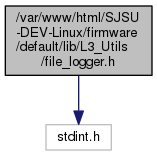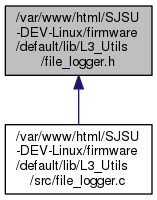This is a logger that logs data to a file on the system such as an SD Card.20140714: Fixed bugs and added more API 20140529: Changed completely to C and FreeRTOS based logger 20120923: modified flush() to use semaphores 20120619: Initial. More...
#include <stdint.h>

Go to the source code of this file.
Macros | |
| #define | LOG_SIMPLE_MSG(msg, p...) logger_log (log_info, NULL, NULL, 0, msg, ## p) |
| #define | LOG_RAW_MSG(msg, p...) logger_log_raw(msg, ## p) |
| #define | LOG_FLUSH() logger_send_flush_request() |
| #define | FILE_LOGGER_BUFFER_SIZE (1 * 1024) |
| Recommend multiples of 512. More... | |
| #define | FILE_LOGGER_NUM_BUFFERS 10 |
| Number of buffers (need to have enough while file is being written) More... | |
| #define | FILE_LOGGER_LOG_MSG_MAX_LEN 150 |
| Max length of a log message. More... | |
| #define | FILE_LOGGER_FILENAME "0:log.csv" |
| Destination filename (0: for SPI flash, 1: for SD card) More... | |
| #define | FILE_LOGGER_STACK_SIZE (3 * 512 / 4) |
| Stack size in 32-bit (1 = 4 bytes for 32-bit CPU) More... | |
| #define | FILE_LOGGER_FLUSH_TIME_SEC (1 * 60) |
| Logs are flushed after this time. More... | |
| #define | FILE_LOGGER_BLOCK_TIME_MS (10) |
| If no buffer available within this time, block time counter will increment. More... | |
| #define | FILE_LOGGER_KEEP_FILE_OPEN (0) |
| If non-zero, the file will be kept open. More... | |
| #define | LOG_ERROR(msg, p...) logger_log (log_error, __FILE__, __FUNCTION__, __LINE__, msg, ## p) |
| #define | LOG_WARN(msg, p...) logger_log (log_warn, __FILE__, __FUNCTION__, __LINE__, msg, ## p) |
| #define | LOG_INFO(msg, p...) logger_log (log_info, __FILE__, __FUNCTION__, __LINE__, msg, ## p) |
| #define | LOG_DEBUG(msg, p...) logger_log (log_debug, __FILE__, __FUNCTION__, __LINE__, msg, ## p) |
Enumerations | |
| enum | logger_msg_t { log_debug, log_info, log_warn, log_error, log_last } |
Functions | |
| void | logger_init (uint8_t logger_priority) |
| void | logger_set_printf (logger_msg_t type, bool enable) |
| void | logger_send_flush_request (void) |
| uint32_t | logger_get_logged_call_count (logger_msg_t severity) |
| uint16_t | logger_get_blocked_call_count (void) |
| uint16_t | logger_get_highest_file_write_time_ms (void) |
| uint16_t | logger_get_num_buffers_watermark (void) |
| void | logger_log (logger_msg_t type, const char *filename, const char *func_name, unsigned line_num, const char *msg,...) |
| void | logger_log_raw (const char *msg,...) |
Detailed Description
This is a logger that logs data to a file on the system such as an SD Card.
20140714: Fixed bugs and added more API 20140529: Changed completely to C and FreeRTOS based logger 20120923: modified flush() to use semaphores 20120619: Initial.
Macro Definition Documentation
| #define FILE_LOGGER_BLOCK_TIME_MS (10) |
If no buffer available within this time, block time counter will increment.
| #define FILE_LOGGER_BUFFER_SIZE (1 * 1024) |
Recommend multiples of 512.
The main parameters are the buffer size, and number of message buffers. The buffer size controls how much data we can cache before we are forced to write it to the output file.
The message buffers are the maximum number of LOGGING calls (macros) that can occur at once after which the caller to LOG macro will be blocked. Note that even a small number like 5 is good enough because as soon as there is time for the logging task to run, it will transfer the LOGGED message into the file buffer immediately. So this number is kind of like a double buffer. On the other hand, please note that while the file is being written, the number of buffers need to be enough because the logger task will be busy writing the buffer to the file.
For example, if we anticipate logging every 10ms, and 1K of data takes 100ms to write, then we should configure the number of logging buffers greater than 10 because while the logger task is busy writing 1K of data for 100ms, we need to be able to write for 100ms, which will take at least 10 buffers.
The flush timeout is the timeout after which point we are forced to flush the data buffer to the file. So in an event when no logging calls occur and there is data in the buffer, we will write it to the file after this time.
| #define FILE_LOGGER_FILENAME "0:log.csv" |
Destination filename (0: for SPI flash, 1: for SD card)
| #define FILE_LOGGER_FLUSH_TIME_SEC (1 * 60) |
Logs are flushed after this time.
| #define FILE_LOGGER_KEEP_FILE_OPEN (0) |
If non-zero, the file will be kept open.
| #define FILE_LOGGER_LOG_MSG_MAX_LEN 150 |
Max length of a log message.
| #define FILE_LOGGER_NUM_BUFFERS 10 |
Number of buffers (need to have enough while file is being written)
| #define FILE_LOGGER_STACK_SIZE (3 * 512 / 4) |
Stack size in 32-bit (1 = 4 bytes for 32-bit CPU)
| #define LOG_DEBUG | ( | msg, | |
| p... | |||
| ) | logger_log (log_debug, __FILE__, __FUNCTION__, __LINE__, msg, ## p) |
| #define LOG_ERROR | ( | msg, | |
| p... | |||
| ) | logger_log (log_error, __FILE__, __FUNCTION__, __LINE__, msg, ## p) |
Macros to log a message using printf() style API
- Note
- If FreeRTOS is not running, the message is immediately output to file. If FreeRTOS is running, the data will be written to buffer using the logger task and eventually flushed out to the file either after the timeout or when the buffer is full.
| #define LOG_FLUSH | ( | ) | logger_send_flush_request() |
Macro to flush the logs. You can flush it using logger_send_flush_request() but the MACRO is provided just to be consistent with the other logger macros where a function is not used.
- Note
- Flushing is not needed when the OS is running.
| #define LOG_INFO | ( | msg, | |
| p... | |||
| ) | logger_log (log_info, __FILE__, __FUNCTION__, __LINE__, msg, ## p) |
| #define LOG_RAW_MSG | ( | msg, | |
| p... | |||
| ) | logger_log_raw(msg, ## p) |
Logs a raw message without any header such as the timestamp.
- Note
- If FreeRTOS is not running, the message is immediately output to file. If FreeRTOS is running, the data will be written to buffer using the logger task and eventually flushed out to the file either after the timeout or when the buffer is full.
| #define LOG_SIMPLE_MSG | ( | msg, | |
| p... | |||
| ) | logger_log (log_info, NULL, NULL, 0, msg, ## p) |
This macro will log INFO message without filename, function name, and line number. This can save space to log simple messages when you don't want to know the function name, line number and filename of where the logger function was called from.
- Note
- If FreeRTOS is not running, the message is immediately output to file. If FreeRTOS is running, the data will be written to buffer using the logger task and eventually flushed out to the file either after the timeout or when the buffer is full.
| #define LOG_WARN | ( | msg, | |
| p... | |||
| ) | logger_log (log_warn, __FILE__, __FUNCTION__, __LINE__, msg, ## p) |
Enumeration Type Documentation
| enum logger_msg_t |
Enumeration of the type of the log message. You should not use this directly for logging call since the macros pass it to logger_log() But these can be passed to logger_get_logged_call_count()
| Enumerator | |
|---|---|
| log_debug |
Debug logs are printed to stdio (printf) unless disabled by logger_set_printf() |
| log_info | |
| log_warn | |
| log_error | |
| log_last |
Marks the last entry, do not use. |
Function Documentation
| uint16_t logger_get_blocked_call_count | ( | void | ) |
- Returns
- the number of logging calls that ended up blocking or sleeping the task waiting for a logger buffer to be available.
If the number is greater than zero, it indicates that you either need to slow down logger calls, or increase the number of log buffers.
| uint16_t logger_get_highest_file_write_time_ms | ( | void | ) |
- Returns
- the highest time that was spend writing the logger buffer to file. This can be useful to assess how many FILE_LOGGER_NUM_BUFFERS we need because we only need enough buffers available while the file buffer is being written.
| uint32_t logger_get_logged_call_count | ( | logger_msg_t | severity | ) |
- Returns
- the number of logged messages for the given severity.
- Parameters
-
[in] severity The severity for which to get the number of calls.
| uint16_t logger_get_num_buffers_watermark | ( | void | ) |
- Returns
- the highest watermark of the number of buffers available to the logger This can be useful to assess how many FILE_LOGGER_NUM_BUFFERS we need in the worst case.
| void logger_init | ( | uint8_t | logger_priority | ) |
Initializes the logger; this must be done before further logging calls are used.
- Parameters
-
[in] logger_priority The priority at which logger should buffer user data and then write to file.
| void logger_log | ( | logger_msg_t | type, |
| const char * | filename, | ||
| const char * | func_name, | ||
| unsigned | line_num, | ||
| const char * | msg, | ||
| ... | |||
| ) |
Logs a message. You should not use this directly, the macros pass the arguments to this function.
| void logger_log_raw | ( | const char * | msg, |
| ... | |||
| ) |
- See also
- LOG_RAW_MSG() You should not use this directly, the macros pass the arguments to this function.
| void logger_send_flush_request | ( | void | ) |
Flushes the cached log data to the file
- Postcondition
- This will send a special request on the logger queue to flush the data, so the actual flushing will finish by the logger task at a later time.
- Note
- Flushing is not needed when the OS is running.
| void logger_set_printf | ( | logger_msg_t | type, |
| bool | enable | ||
| ) |
Enables the given logging severity call to be also printed on printf()
- Parameters
-
[in] type The severity for which the logging call will be printed [in] enable If true, the severity level will also get printed to the screen
Note that if a lot of data is being printed, the logger call may take a while until the stdio printf() returns back.


 1.8.11
1.8.11